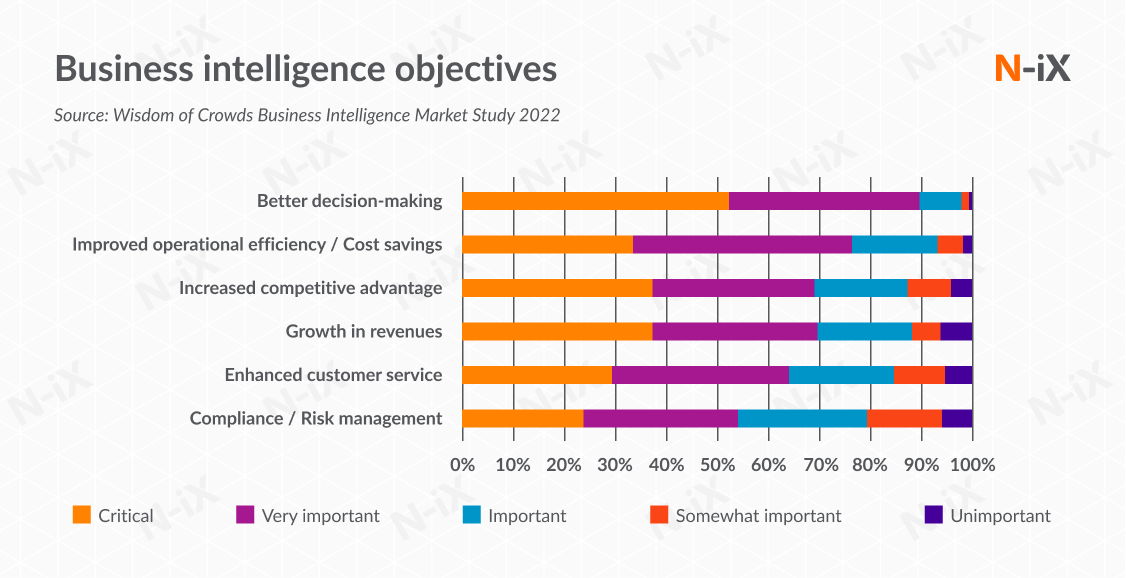Business Intelligence (BI) refers to the process of collecting, analyzing, and presenting data to support business decision-making. In the manufacturing industry, BI is crucial in gaining business agility and improving business performance. By leveraging BI tools and techniques, manufacturers can unlock the value of their data and use it to optimize production, reduce costs, and focus on corporate social responsibility.
BI for manufacturing provides insights that drive innovation and efficiency. In an industry where profit margins are often thin, manufacturers must find ways to operate more efficiently to remain competitive in a highly digitalized industry. Business Intelligence for manufacturing gives the information and insights they need to make data-driven decisions and stay ahead of the competition. This article will discuss the challenges associated with implementing BI in manufacturing and provide best practices for successful BI adoption.
What is the role of Business Intelligence in the manufacturing industry?
The manufacturing industry is transforming significantly, driven by rapid technological advancements and increasing globalization. This transformation has given rise to the need for greater operational efficiency and adaptability as manufacturers seek to optimize their production processes and respond to ever-evolving market demands. Business Intelligence is instrumental in addressing these needs, as it enables manufacturers to harness the power of data to make informed decisions, streamline operations, and enhance overall business performance.
For example, by employing BI tools and techniques, manufacturers can:
- Monitor production processes in real-time, quickly identifying bottlenecks and areas for improvement.
- Analyze historical data to identify trends and patterns that can be used to predict future demand, enabling more accurate planning and inventory management.
- Use data-driven insights to optimize supply chain management, reduce lead times, and improve supplier relationships.
- Enhance product quality by leveraging data to identify and address production issues before they escalate.
Read more: 2023 guide to digitization in manufacturing in 5 essential steps

Key components of Business Intelligence in manufacturing
BI in manufacturing encompasses various tools and techniques, all aimed at transforming raw data into actionable insights. These crucial components help improve the manufacturing process with BI:
-
Data sources and collection. The first step in implementing a BI system is to identify the data sources that will be used to support decision-making. In manufacturing, these data sources may include production data from machines, inventory data from warehouses, sales data from customer relationship management (CRM) systems, and more.
-
Data collection and integration. The next step in the BI process involves gathering data from various sources (such as sensors, production equipment, and enterprise resource planning systems) and integrating it into a centralized data warehouse or platform.
-
Data analytics and visualization. This Business Intelligence for manufacturing component involves analyzing the collected data using advanced analytical techniques, such as predictive analytics, machine learning, and artificial intelligence, to uncover hidden patterns and trends. Visualization tools, such as interactive dashboards, are used to present these insights in an easily digestible format.
-
Reporting and decision support. The next component of BI for manufacturing involves providing actionable insights and recommendations to decision-makers, enabling them to make informed decisions based on data-driven evidence.
-
Implementation and adoption. The final step involves integrating the BI system into the organization's workflows and ensuring stakeholders are trained and equipped to use the system effectively. Adoption may involve change management strategies, such as communication plans, training programs, and incentives to encourage adopting and using the BI system.

Use cases of Business Intelligence for manufacturing
In today's competitive manufacturing landscape, leveraging data-driven insights is paramount for businesses seeking to enhance efficiency, optimize processes, and drive innovation. Let’s delve into Business Intelligence for manufacturing use cases, exploring how it is revolutionizing various aspects of the industry – from supply chain management to inventory control and from predictive maintenance to production scheduling.
1. Production scheduling
BI enables manufacturers to optimize production scheduling by providing real-time insights into machine utilization, employee availability, and material resources. Manufacturers can forecast production demand by analyzing historical data, applying predictive analytics, and adjusting their schedules accordingly. It helps minimize production downtime, reduce work-in-progress inventory, and ensure deadlines are met. Furthermore, BI allows for identifying potential bottlenecks and inefficiencies, enabling manufacturers to allocate resources effectively and streamline their production processes.
2. Supply chain management
Business intelligence is crucial in enhancing supply chain management by offering real-time visibility into supplier performance, lead times, and order fulfillment rates. By analyzing this data, manufacturers can identify potential risks and vulnerabilities in their supply chain, enabling them to take corrective actions and minimize disruptions. Additionally, BI tools can help manufacturers identify opportunities for cost savings, such as negotiating better pricing or consolidating orders, ultimately improving the overall efficiency and profitability of the supply chain.
3. Inventory control
Effective inventory control is essential in manufacturing, as excess inventory can lead to increased carrying costs and waste, while insufficient inventory can result in stockouts and lost sales. BI allows manufacturers to maintain optimal inventory levels by providing accurate, real-time insights into stock levels, sales trends, and product demand. By employing advanced analytics and forecasting techniques, manufacturers can predict future demand patterns and adjust their inventory levels accordingly, minimizing stockouts and reducing carrying costs.
4. Quality management
BI can significantly improve the quality management process in manufacturing by providing real-time data on product defects, production errors, and equipment performance. By analyzing this data, manufacturers can identify the root causes of quality issues and take corrective actions to prevent future occurrences. BI can help manufacturers monitor supplier quality, ensuring incoming materials meet the necessary standards and specifications. Ultimately, leveraging BI in quality management leads to higher customer satisfaction and a stronger brand reputation.
5. Energy consumption and sustainability
Manufacturers can use BI to monitor and optimize their energy consumption, reducing costs and improving sustainability. Manufacturers can identify areas where energy consumption can be reduced by collecting and analyzing data on energy usage patterns and equipment efficiency, such as by implementing energy-saving technologies or optimizing production processes. BI can help manufacturers track their environmental performance, ensuring compliance with regulatory requirements and demonstrating their commitment to sustainability.
6. Workforce management
Business Intelligence can be applied to workforce management, helping manufacturers to optimize labor allocation, identify skill gaps, and improve employee productivity. Manufacturers can make informed decisions about training, resource allocation, and workforce planning by analyzing employee performance, attendance, and skill sets. It ensures that the right personnel are assigned to the right tasks, boosting productivity and reducing labor costs.
7. Predictive maintenance
Utilizing BI in predictive maintenance allows manufacturers to minimize equipment downtime and extend the lifespan of their machinery. By collecting and analyzing data on equipment performance and maintenance history, manufacturers can identify patterns that indicate potential failures before they occur. It enables them to schedule maintenance proactively, reducing downtime and the associated costs while ensuring their equipment operates at peak efficiency.
Read more: Business intelligence development: why, what, how?

Best practices for successfully adopting Business Intelligence for manufacturing
To overcome the common challenges and ensure the successful implementation of Business Intelligence in manufacturing, organizations should adopt the following practices:
Starting with a clear business case and BI strategy. Manufacturers should have a clear understanding of the specific business problems that the BI system is intended to solve. It should involve identifying the expected benefits and ROI of the system, as well as the metrics that will be used to measure success.
Ensuring data quality and consistency. Organizations should invest in robust data management practices to ensure their data is accurate, consistent, and reliable. It includes implementing data validation, cleansing, and standardization processes, as well as establishing clear data governance policies and procedures.
Involving stakeholders from across the organization. Implementing a BI system requires buy-in and support from stakeholders across the organization. Manufacturers must cooperate with representatives from different departments and functions to design, implement, and adopt the BI system. It will ensure that the system is aligned with the organization's needs and that all stakeholders are invested in its success.
Leveraging modern BI tools and techniques. Modern BI tools and techniques can help manufacturers unlock the full potential of their data. These tools consist of adopting Cloud-based BI solutions, using data visualization and analytics tools, and leveraging Artificial Intelligence, Machine Learning, and Deep Learning to enhance data analysis and interpretation. By leveraging these tools and techniques, manufacturers can gain deeper insights into their operations and make more informed decisions.
Monitoring and measuring progress. Manufacturers should establish a set of metrics to monitor and measure the success of their BI initiatives, allowing them to track progress and make necessary adjustments along the way. Regular reviews and audits may involve ensuring the BI strategy aligns with the organization's goals and objectives.
Read more: Business intelligence outsourcing: how to make it work?

Key takeaways
The adoption of Business Intelligence in the manufacturing industry holds immense potential for driving operational efficiency, reducing costs, and enhancing customer satisfaction. By understanding the relationship between manufacturing and BI and addressing the challenges associated with its implementation, manufacturers can harness the power of data to make informed, data-driven decisions that drive business success. Organizations can position themselves to fully capitalize on the benefits that Business Intelligence offers, especially when partnering with a technology leader in delivering BI solutions in an increasingly complex and dynamic global market.
Why choose N-iX for your Business Intelligence in manufacturing project?
As a global software engineering company boasting 21+ years of experience and a team of 2,200+ tech experts, N-iX has established itself as the go-to partner for businesses seeking to implement cutting-edge Business Intelligence solutions. With the portfolio comprising BI projects for global market leaders, such as Lebara, Gogo, and Ringier, N-iX is uniquely positioned to deliver guidance through all stages, from business analysis to solution development, lifecycle management, and support management. N-iX helps address common challenges of implementing Business Intelligence solutions in manufacturing by:
- Ensuring the quality and consistency of data by establishing clear data governance policies and procedures;
- Integrating BI tools with the existing systems, including ERP, MES, and SCADA systems;
- Ensuring change management by delivering knowledge transfers and ongoing training;
- Contributing to scalability and flexibility by employing Cloud-based solutions that ensure that your BI infrastructure can be easily scaled up or down to accommodate potential changes;
- Ensuring security and compliance by incorporating industry-leading security measures, including data encryption, access control, and security audits.
Have a question?
Speak to an expert




